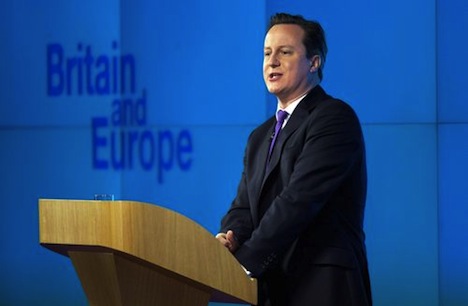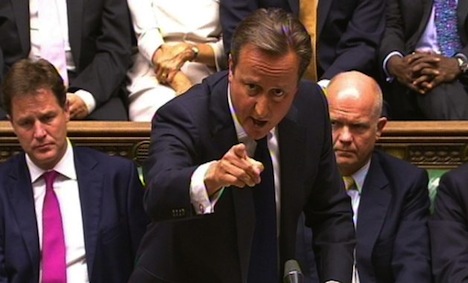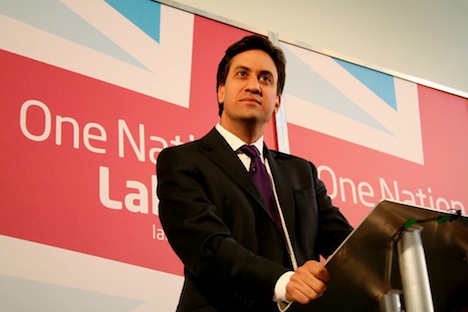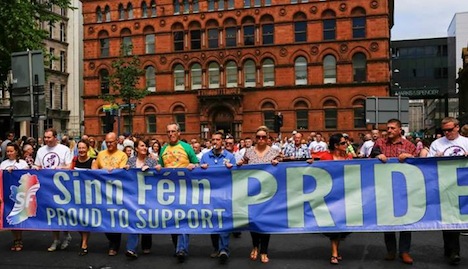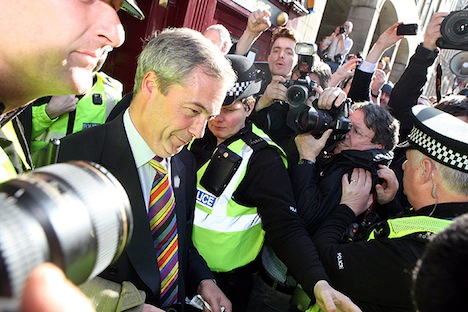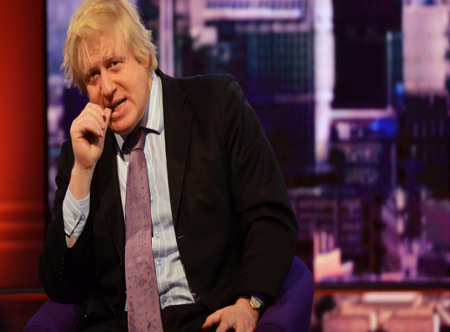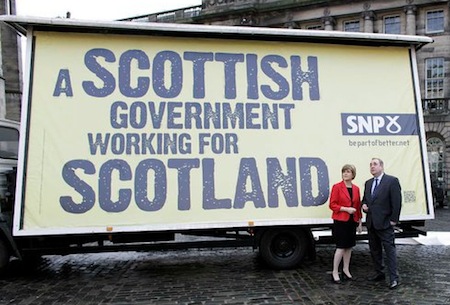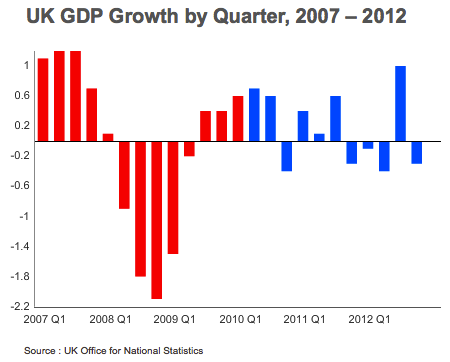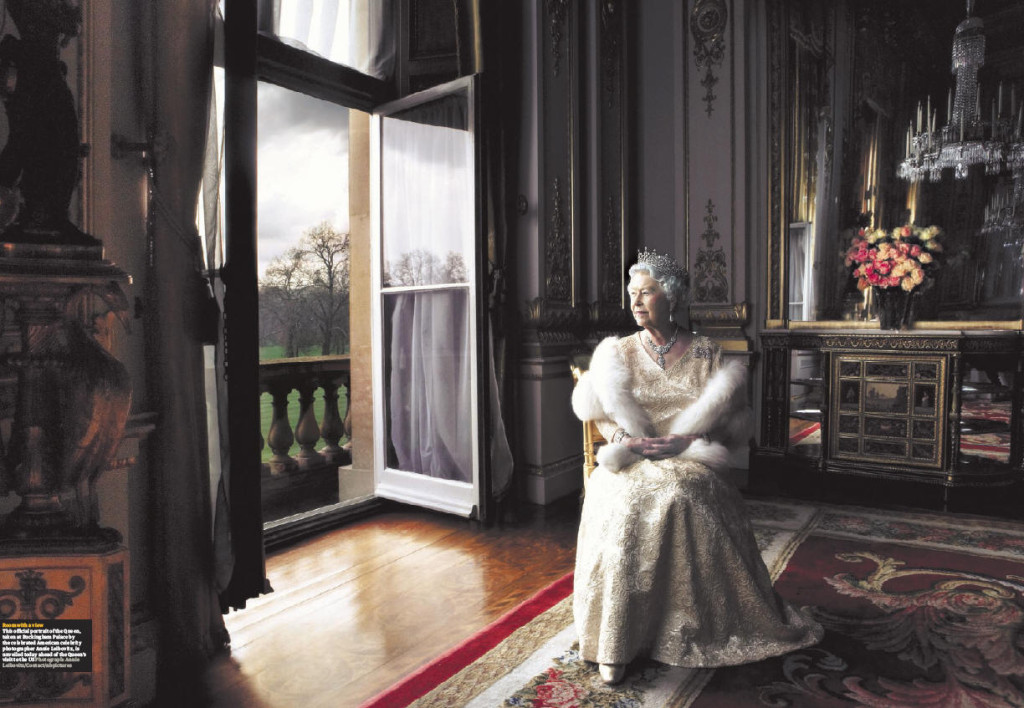
Like most folks who have no really strong feelings about the British monarchy (I’m neither incredibly pro-monarchy or anti-monarchy as far as constitutional monarchies go these days), I spent much of the past two days avoiding the coverage surrounding the birth of the royal prince born Monday to Prince William and Kate Middleton. 
But Dylan Matthews, over at The Washington Post‘s Wonkblog, used the opportunity of the young (as yet unnamed) prince’s birth to make the case that constitutional monarchies are preferable to republics with elected heads of states, and that is a question in which that Suffragio readers ought to be incredibly interested. It’s a piece I read with keen excitement, it makes some very smart points, and it makes this rather sweeping conclusion:
Constitutional monarchy is the best form of government that humanity has yet tried. It has yielded rich, healthy nations whose regime transitions are almost always due to elections and whose heads of state are capable of being truly apolitical. The U.S. would do well to adopt it.
The punchline is that a constitutional monarchy is preferable to a republic with an elected, ceremonial head of state. That’s because a monarch’s position is not rooted in any legitimate political process, unlike a president who is elected either directly by ballot or indirectly by a national parliament — when political crises arise, a monarch is less likely to intervene in political affairs, thereby resulting in new elections; in contrast, an elected president is more likely to engineer a new government without new elections:
The key to monarchs’ success is that they’re totally illegitimate. The people wouldn’t stand for Queen Elizabeth exercising real political power just because of who her father was. That’s a powerful deterrent that prevents monarchs from meddling in political affairs. The result is that in all but very rare cases, prime ministers in monarchies are never thrown out of office except when they call elections or when they receive a vote of no confidence in parliament. The head of state can’t touch them.
It’s an interesting thesis, but I’m not sure that it holds up nearly as well as Matthews thinks it does.
He begins with what I believe is the weakest argument of all — that constitutional monarchies are healthier and richer than other republics, and he presents a graph that purports to show that, on average, constitutional monarchies are richer and healthier (see below the chart from Wonkblog):
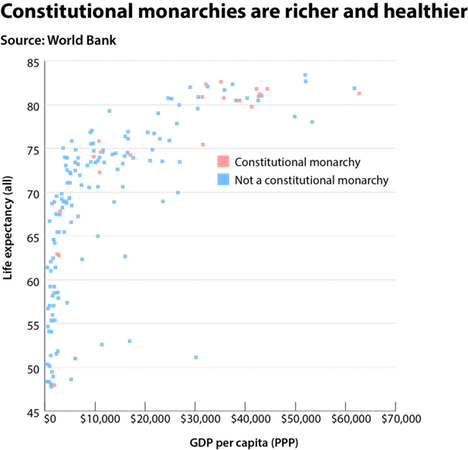
But of course, ‘correlation does not equal causation.’
There are a lot of historical and economic reasons that explain why constitutional monarchies, which are predominantly located in Europe, are so much richer and healthier. North America and Europe are, well, richer than Africa or the Middle East or South America, in general terms, but it seems like ‘having a constitutional monarchy’ is not incredibly high on the list of reasons why Europe’s standard of living is so much higher than Africa’s. The legacy of colonialism, for one.
After making this correlation, Matthews then backs off the claim somewhat:
Of course, this doesn’t demonstrate that having a constitutional monarchy makes countries richer, only that it’s totally possible to both be a healthy, rich country and be a constitutional monarchy. The practice is hardly a “grotesque relic.”
Still, the chart that states ‘constitutional monarchies are richer and healthier’ is not subtle, and I’m sure Matthews doesn’t mean to argue that Nicaragua or Paraguay or Kyrgyzstan would today have a GDP per capita of $40,000 if only they had introduced monarchies a century ago. Nor do I believe Matthews would defend the absolute monarchy of Swaziland, which boasts the world’s highest HIV/AIDS rate and where GDP per capita routinely falls even below that of neighboring South Africa. Is Swaziland better off today from the benevolence of King Mswati III? I don’t find that argument credible.
Thereupon, Matthews points to countries like Germany, Italy, Israel, Ireland, and India, which all have elected, mostly ceremonial, presidents:
Opponents of constitutional monarchy often point to this as their preferred alternative. The British group Republic supports abolishing the monarchy and replacing it with a directly elected president, and estimates that the British royal family costs almost ten times as much as the German president. So why not just do that, then?
But that sets up a false equivalency — at one point, Matthews writes, ‘ If Britain chose to depose its divinely ordained rulers, it’d still need a head of state.’
And that’s just not true. There’s no theorem of international relations that requires a parliamentary system to have a separate head of state. Matthews notes that only the sultans of Brunei and Oman simultaneously serve as prime minister. But in the United States, the president also essentially serves as the simultaneous head of state and head of government (unless you’d like to argue that John Boehner, speaker of the U.S. House of Representatives, or Harry Reid, the U.S. Senate majority leader, are the heads of government, though I think it would be a difficult argument). In any event, even if we don’t particularly prefer the Bruneian or Omanese models, it doesn’t mean that it’s a bad model from an abstract governance standpoint.
The only rationale in favor of having a ceremonial head of state is for purposes of national unity. In Spain, for example, the return of Juan Carlos I was an important step in the transition from the Franco dictatorship to robust democratic Spanish state we recognize today. But that example isn’t theoretical, it’s grounded in time and place to specific historical events, and it doesn’t provide a rationale for any other European monarch or ceremonial president, least of all in the United Kingdom. The existence of the British monarchy hasn’t stopped the push for devolution and even independence in Scotland, for example, and there’s no reason to believe an elected president would make any difference. Continue reading Are constitutional monarchies better than presidential republics? Correlation ≠ causation! →
![]()
![]()



